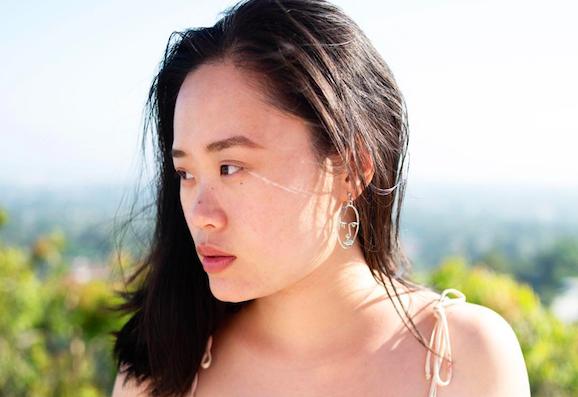*This interview with Michele Selene Ang was conducted on April 23rd, 2019.*
At Liberty High, heightened emotions are pretty much the norm these days. After Hannah Baker’s tragic suicide, and the release of a number of secrets on the tapes she recorded detailing her rationale behind the act, not a day goes by within the haunted halls of her former campus that isn’t brimming with drama. Jocks taunt lesser-status students with their powerful demeanors. Geeks use their imaginations and nightmares to retaliate with cyber-attacks. Girls cover the walls of the bathroom stalls with hits targeting their peers. Boys break out in massive brawls, slamming each other into lockers and throwing sucker punches, sometimes even without reason. Sometimes the administration gets involved in these giant, pubescent war zones.
And then, there’s Courtney Crimson, who’s already done her worst, and is ready to move on. Good news for the guys in the war zone; she’s there to pull the fire alarm when it’s at its worst.
“F**king boys,” she hisses before she turns around and walks out of the school.
We don’t know yet where the Netflix drama 13 Reasons Why will pick up. Where we’ve left off, many characters (like Courtney) are preparing to head off to college. If her arc is discontinued, gems like this line will have to be carried out by other characters. And with Courtney’s much-earned fresh start, the actress who portrays her, Michele Selene Ang, will also be forging ahead in her budding career—seeking, in many ways, a new start of her own.
Michele Selene Ang Discusses Her Budding Career, the Hollywood Experience, and the Hit Show That Kickstarted Her Journey
13 Reasons, 21 Adolescents, Two Big Questions
Adapted from the novel by Jay Asher, 13 Reasons Why follows the students of a suburban California town as they navigate the psychology behind why their classmate, Hannah Baker (Katherine Langford) ended her own life. In its first season, it mostly follows the plot of the book, with some modifications to subplots and character choices. Season 2 was built from scratch, as a sort of sequel to the book that reaps the rewards of the “everyone has their own side of the story” trope. The third season will premiere this spring, date to be announced.
Heralded for its brave approach to dark subject matters, as well as its very realistic depiction of the high school experience, the show has also been criticized for its portrayal of graphic events. In response, Netflix placed strong advisory warnings in front of its most triggering episodes. For a teen drama, it certainly sets a new bar for the audience at which it is aimed. The show begs the question, as many of its characters do, of how long we can shelter teenagers from the harsh realities of adulthood when they’re forced to deal with serious “grown-up” issues from such a young age.
On the flip side, it asks of our larger institutions what more can be done to protect youth from these hardships.
Beginnings: Talent Meets Luck
Michele doesn’t do a whole lot of sit-down interviews; it’s clear this is an experience that makes her nervous, despite the genuine, honeyed smile with which she masks her moderate discomfort. She hunches in to hear me over the alt-rock music and other patrons in the quirky bistro she’s selected for us to meet. Her right hand wraps around her iced coffee, leaving her left hand ready to gesticulate as she divulges to me the beginnings of her professional journey—but not without extreme humility. “I have difficulty with the word ‘career’ because I feel like I’m running towards it, and building it. A career isn’t three years. A career is fifty years.”
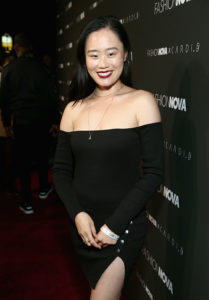
But the harsh reality of the entertainment industry is that, no matter how talented an artist one may be, next to no one walks out of training, diploma in hand, and is offered a job. After up-ending her life from northern California to move across the country, where she studied acting at Fordham University, Michele found herself back on the west coast within weeks of graduation. The quintessence of the adage “talent meets luck,” Michele was awarded the role of Courtney, Liberty High’s popular and prideful student government princess, after submitting to an open call during her senior year.
“Going into the callback, I remember so vividly, because in most casting offices they have framed posters of movies that they’ve worked on, and I was looking around this small cozy office and I vowed to myself, ‘I am going to do this, no matter how hard it is, no matter how long it takes.’ And I went and I did it,” she recounts. “And then I got that particular call from LA and a woman from Paramount told me that I got it and I was to fly out the next day. It happened that fast.”
Michele and fellow Fordham classmate Tommy Dorfman, who also co-stars on 13 Reasons Why, had the unique task of adapting their theatre training to the screen. “I think the best thing about theatre training and theatre-trained actors is that they know how to do the work and they know how to get their hands dirty. Stepping in front of the camera was really hard for me at first, because I had to adjust to the various technicalities of filmmaking.” A huge difference for a theatre actor is adapting to the intimacy of the camera. She mentions watching the more seasoned actors on the show, such as Kate Walsh, and learning from their craft.
Another challenge unique to television is going in and out of character over a period of time that sometimes lasts years. This was also eased by her theatre training, despite not being a common practice of stage work. “I think if you’ve done all the work before you step in front of the camera for the first time, that’s what every actor needs to do. Before the callback, I did the 7 questions, the backstory, the scene breakdown, everything. And once that’s done you feel good as an actor because you know you can just let it all go and play.”
And Play, She Did
As adequate as the 2007 novel was at depicting the high school experience in the year it was published, the series adjusts to reflect social issues in even more present time. The character of Courtney, particularly, became a device through which to modernize the realities that high schoolers face. In the book, Courtney is still a street-cred seeking bully, but she’s not depicted as a lesbian. She had, arguably, more play room than most of her castmates.
“When I got the callback sides I was surprised,” Michele says, “but the more I thought about it, the more it made sense in my head.”
Creating a backstory is integral to any actor’s process, and can be the most liberating and fun part. It certainly was for Michele, who worked in depth with the writers and showrunners on developing a history and biography that would inform Courtney’s transgressions even more than the book does. “[The writers] were struggling with how to justify her actions—how to make her a rounded, three-dimensional human being, like what was the drive behind her actions? What would lead her to do this to another woman, another girl?” Most high school girls experience pressure and obsession with popularity. The added aspect of Courtney’s hidden sexuality would certainly amplify the stakes, leading her to contribute so significantly to the decline in Hannah’s mental health.
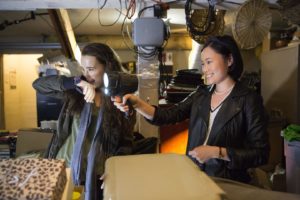
Photo by Beth Dubber/Courtesy of Netflix
Also new to the character’s world were her gay dads, who gave further justification to the fear that Courtney feels over revealing her sexuality, raising her as their perfect princess. “I can empathize as someone who grew up in a small town. With two gay dads, no matter how progressive the town may be… in small towns, people tend to talk, and I imagine growing up with two dads wasn’t the easiest time for her, and seeing all of the negative attitudes towards her parents growing up led her to think that she needed to protect herself.”
A “Perfect” Dichotomy
The 25-year-old actress is wise beyond her years, which one can imagine was part of her appeal when auditioning for her role as Courtney. The poise with which she holds herself speaks to her education and sensibilities, though her youthful face likely would have been carded had this been cocktail hour and not afternoon coffee. All of these actors, while convincingly portraying high school students, have significantly more years and maturity under their belts than the characters they embody.
Still, the students at Liberty High think they are grown-ups, undoubtedly. They just lack the cranial development needed to make adult choices. Some characters in the series seem to grasp the concept more quickly than others; like Courtney. We see her hit that point in Season 2, when she admits the truth about her sexuality on the stands in the Baker family’s trial against the school’s administration, which is being accused of not taking the necessary measures to protect their daughter in her cries for help.
While the problem ended with the administration, it started with the student body and the bullying that occurred within the halls at Liberty High. It is an endless cycle, and likely a reaction to every young person’s desire for popularity and positive reputation. “[Courtney] is type A. And the thing about her is that she’s very insecure and fearful of what other’s think about her. She needs to be liked and perfect,” Michele says of her character.
But in order for “perfect” to exist, there has to be the imperfect. In order for “liked” to exist, there needs to be the hated. What Courtney participates in is a unique form of slut-shaming. She does so in order to protect herself. There is such pressure for girls to be attractive and liked. But the second it goes “too far,” it leads to such an extreme loss of worth. And this is a concept that transcends high school.
Resurrecting the Brave Woman
An industry that puts its most beautiful women on display in conventionally typed roles is a prime culprit of inciting toxic pressures. Hollywood, in its own way, can procure the same ills as the American educational system. Thankfully, Hollywood is run by more adults than high school admittedly is, and has efforted to actively fight these offenses.
“Because of Time’s Up, because of the attitude and the responsibility for casting decisions or who you decide to include in your project, because sensitivity matters not only on screen but behind the scenes as well—maybe even more behind the scenes—we’re all being held accountable. You can’t get away with as many things as you could have in the past,” Michele explains of her experiences.
Similarly to how Courtney and Hannah have to fight against prejudices, Michele is just one of many women in Hollywood who has to do the same when going out for new roles. “No actor wants to get pigeonholed. That being said, I am grateful for a lot of auditions that have come my way and that I have enjoyed preparing for.” She speaks with graceful composure, but I know there’s more to her desires. She presses the scrunchie holding half of her long, dark hair back into her head.
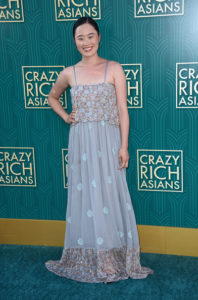
“People are hungry for stories that represent who they are when they have been underrepresented for so long. 2019 is the time we start saying no. We’re not gonna accept it anymore. And Time’s Up is just one big slice of the pie. But it’s really good to see Captain Marvels in the world, and everyone speaking out.” The young actress has made her support of the Asian-American community, specifically women, a key pillar of her platform. She shares work that fights stereotypes against Asian women on her twitter, and is far from shy about the topic of representation and equal opportunity in our conversation.
I mention Sandra Oh, and her incredible career as a woman of color who has played strong, passionate women who defy female stereotypes consistently throughout her career; most recently Eve Polastri on the hit BBC thriller/drama, Killing Eve.
“The creator of Killing Eve is a woman. That is why. And I’ve seen so many shows and read certain pilots written by women who portray women in this light, and people are like ‘why hasn’t this happened before.’ And it’s because most of the roles were written by white men before.”
God forbid we hire people who can write the characters we know and need—flawed and fervent female characters; brave female characters.
Courtney proves herself brave. More so than most of her classmates. Her deposition and appearance in the courtroom could have been flecked with the same lies many of her peers employed in efforts to preserve their social statuses, but she is powered to act in justice for Hannah, and right her wrongdoings to her tragically deceased peer. Courtney gives us hope for the youth of the future. “I think she would study business or law [in college] because I do think that she wants to help people. Truly. And help people know their rights. I think she’s very passionate; her temperament is very suited for a lawyer. Or a businesswoman or an entrepreneur.” She evolves from a well-liked but scared girl into a poised and shameless young woman—an evolution that is related to by her portrayer as she presses on, pursuing new roles.
What White People Don’t Get
The representation depicted at Liberty is another one of the show’s greatest strengths. “It’s one of the things I think about in my day-to-day life,” Michele says. “I think the goal was really just to cast the best person for the part. And I like to think they had diversity in mind. In the book, [Courtney] wasn’t Asian. She wasn’t specified, and the writers would say like, ‘well maybe she was an orphan’ and all these things to cause her to question who she is,” adding to the backstory that contributes to Courtney’s development and choices.
Hollywood has definitely made strides towards diversity and inclusivity. “I think people are starting to realize that they can’t get away with not doing so anymore. I feel like the show has done a lot to open doors. There’s still a lot of pushback. But as long as the creators continue to be courageous, it’s only going to get better from here.”
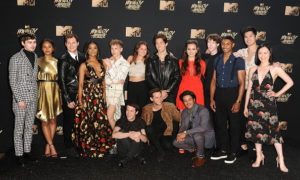
13 Reasons Why has one of the most ethnically diverse casts on the small screen. Companies like Netflix have been frontrunners in making such strides, producing a significant amount of original work featuring actors of color, including Aziz Ansari’s post-Parks and Recreation project, Master of None, which actively tackles Hollywood’s race problem; and the newer romcom To All the Boys I’ve Loved Before, which stars Lana Condor as the female lead in a script that is, while inspired by a book written by a Korean-American author, revolutionarily in no way informed by her character’s Asian-ness. “It makes me so happy when I hear someone say ‘oh my god, that’s us represented on screen,’” Michele says, “But at the same time I wish it didn’t need to happen. So, it is important, it really is, [no matter how] subconscious or subliminal, that’s what makes it so dangerous, is because we don’t realize it.”
The Ugly Truth
Where the show is lauded for its realistic portrayals of high school, both in its content and the diversity of its cast, it has also been met with alarm from organizations like the National Association of School Psychologists and the United States Society of Clinical Child and Adolescent Psychology, both of whom cite research that depiction of self-harm and suicide can often serve as a trigger to at-risk youth. Just this week, Nylon put out an article presenting research that teen suicide had spiked nearly 30 percent since the shows release; though no correlation between the viewership of the series and the tragic statistic can be proven.
“The show covers a lot of issues that we all deal with in varying degrees. I really do think after it came out it created a whole explosion of high school shows that are edgier now on every major channel, [depicting] high school as a battleground or a war,” Michele says. Still, 13 Reasons Why tops the spectrum of the boundaries that these shows push, vividly depicting the ugly, as shying away from doing so would minimize the events that so many teens realistically experience. “I do support the writers and the storytellers of the show because I believe very strongly that they won’t do anything unless they truly believe that it is necessary, and that it is very thoroughly researched beforehand within a group of writers and health professionals.”
It’s a challenging project to tackle, and that’s what makes it so courageous. “I’ve heard a lot of backlash from adults; saying ‘we can’t let our children watch this,’ which I totally understand, if I were to put myself in the shoes of a parent. But at the same time, for me, high school wasn’t THAT long ago. I do believe that teens aren’t as innocent as most of us collectively perceive, especially now, with so much information readily available.”
Starting the Conversation
Children who are at-risk for suicide are notoriously difficult to detect. More often than not, the signs are subtle, if present at all. Hannah missed the opportunity to share what happened to her because she was afraid of her reputation; Mr. Porter, her guidance counselor, missed the opportunity to see the signs and help someone who was in immediate crisis. She didn’t have the courage to say anything, and that is not her fault, because sexual assault comes with so much pain and shame. Schools lack emotional education. Until that changes, it’s on us to learn how to receive that information when girls decide to come forward. After her death and another suicide attempt from another student (a former friend), Liberty High actively silenced all discussion of suicide, adopting the same philosophy that the teaching of sexual abstinence suggests—if you don’t interact with the situation, it is the most effective in preventing unwanted results. And we all know how effective that is.
Suicide and sexual assault are difficult to talk about, but they happen. So we have to talk about them, as well as their effects. Teens have so much going on inside, and so little ability to share with anybody. They’re afraid of burdening others, and that no one will understand. In Hannah’s case, no one did.
In the same way that Liberty High suppresses these very serious topics, so many parents, schools, and organizations are lashing out at the series and discouraging their children from viewing it. The show, which very much treats their audience as young adults—not teenagers—is an overt retaliation to the withholding of truth, which is a necessary staple in the diets of young people. The reality is, the adults making these decisions don’t realize the scope of the bullying that has resulted in suicide becoming the second leading cause of death amongst teens, because social media and cyberbullying, where Hannah’s story (and so many others) starts didn’t exist 20+ years ago. For this generation of young people, bullying doesn’t end once school lets out. For this generation of young people, their whole worlds are school and social media. There is no safe space.
“The paradox of it all is that, as lonely as you can get sometimes, there have been moments where I’ve felt very seen and connected because of something that people put up on social media. So I do have a complicated relationship with it, as do most people,” Michele says.
The stories presented within 13 Reasons Why aim to change the way that millennials treat their peers. Where high school is such a developmental time for children to become adults, it is not a civil experience. And the show does not treat it as such. It shows uncomfortable events because they are, in fact, uncomfortable. It can be painful to watch because it is, in fact, painful. “The thing about the show is that I know for a fact that they were adamant on making sure that it was appropriate and correct, working with the health professionals and the therapists that were brought in to help my cast mates and me with [our] jobs.”
Far From the Last Word on Youth, the Reasons, and Michele Selene Ang
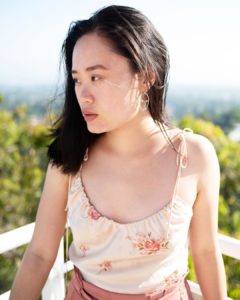
The key here is open-mindedness. Maybe the issues depicted in this highly-debated chronicle are bigger than teens and high school. Maybe they transcend that age group and infiltrate multiple different institutions. Certainly, we’ve seen it in Hollywood. Many of us have experienced them firsthand. If the purpose of the show is to create awareness, it succeeds. It also succeeds in beginning discussions between young people, their establishments, and parents.
Michele’s story on 13 Reasons Why has always been as a recurring character, and while Courtney’s future at Liberty High is not fixed, she is actively pursuing new projects as an actor, and otherwise. “I’m very interested in writing. I want to be a writer. But there’s a part of me that needs to feel like I have credibility in all the things that I want to try or pursue. And I know that I’m an actor. I have my degree. I’ve spent time and worked on acting. But I do eventually want to be a writer.” She’s begun by keeping a journal on her personal website, where she has so far documented her notes on auditioning.
She can’t say much about what to expect from the upcoming season of the show that marked her big break, but she does give us this: “There’s some tea that’s very hot that I obviously can’t share. But it is going to be revelatory, and once those truths are revealed, it’s going to shed new light on past seasons. There’s a lot to look forward to, and the writing is TOP NOTCH.” Michele’s confidence in the work being done on the series is exciting, but her work as an actress (and a very young, Asian-American one, at that) speaks for the show enough, without her assisted validation.
“You do realize that you’re a role model now, right?” I ask.
“Absolutely. Whenever I remember that I feel very validated. Certain people have told me ‘I look up to you and I much admire what you’re doing.’ So I guess every time someone is kind enough to say that, it makes me feel all the more determined to keep pushing on.”
“Any last words for readers at Last Word?” I ask.
“Thank you, I love you! Eat your greens, put on sunscreen.”
If you or a loved one is in crisis, seek help NOW. Call the National Suicide Prevention Lifeline at (800) 273-TALK, or visit 13reasonswhy.info for additional resources.
Main photo courtesy of Chris Waggoner.
Embed from Getty Images
Embed from Getty Images
Embed from Getty Images

